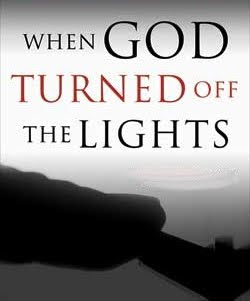The Word for today:
Psalm 88
There are many rooms in our Father's house, but some we'll never see. The doors will all be open, but I don't think we'll find the switch.
I have read what men call the great authors. I have read them all. But when I met up with the Bible,
I put childish things away. (1)
Since then, I have read and re-read the Bible--all of it perhaps 20 times; portions of it 100 times. And I have entered Psalm 88 one thousand times, but I have never entered in.
When the covenant that saved us was fulfilled on the cross, our Father turned the light of the world off for three hours. What occurred there was done, our souls to save--but not our eyes to see:
Now from the sixth hour until the ninth hour there was darkness over all the land. (Matthew 27:45)
My meager comments can only get in the way of Psalm 88, because the psalm speaks of what David called
things too high:
LORD, my heart is not haughty, nor mine eyes lofty: neither do I exercise myself in great matters, or in things too high for me. (Psalms 131:1)
So I will tiptoe out of this room now. You linger, and listen. Although God shut our eyes to the cross, he did not shut our ears.
But before I leave, let me direct you to Psalm 22. Reading Psalm 22:1-2, you are reading, as it were, the title and first verse of Psalm 88:
My God, my God, why hast thou forsaken me? why art thou so far from helping me, and from the words of my roaring?
O my God, I cry in the daytime, but thou hearest not; and in the night season, and am not silent.
Listen a long while. A man once spent three hours right here. And don't bother looking for the switch. I've looked one thousand and one times now, and never found it.
Psalm 88
O LORD God of my salvation, I have cried day and night before thee:
Let my prayer come before thee: incline thine ear unto my cry;
For my soul is full of troubles: and my life draweth nigh unto the grave.
I am counted with them that go down into the pit: I am as a man that hath no strength:
Free among the dead, like the slain that lie in the grave, whom thou rememberest no more: and they are cut off from thy hand.
Thou hast laid me in the lowest pit, in darkness, in the deeps.
Thy wrath lieth hard upon me, and thou hast afflicted me with all thy waves. Selah.
Thou hast put away mine acquaintance far from me; thou hast made me an abomination unto them: I am shut up, and I cannot come forth.
Mine eye mourneth by reason of affliction: LORD, I have called daily upon thee, I have stretched out my hands unto thee.
Wilt thou shew wonders to the dead? shall the dead arise and praise thee? Selah.
Shall thy lovingkindness be declared in the grave? or thy faithfulness in destruction?
Shall thy wonders be known in the dark? and thy righteousness in the land of forgetfulness?
But unto thee have I cried, O LORD; and in the morning shall my prayer prevent thee.
LORD, why castest thou off my soul? why hidest thou thy face from me?
I am afflicted and ready to die from my youth up: while I suffer thy terrors I am distracted.
Thy fierce wrath goeth over me; thy terrors have cut me off.
They came round about me daily like water; they compassed me about together.
Lover and friend hast thou put far from me, and mine acquaintance into darkness.
**************
(1) 1 Corinthians 13:11






















